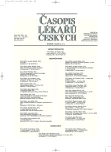-
Medical journals
- Career
Physician and freedom of conscience
Authors: Marta Munzarová
Published in: Čas. Lék. čes. 2012; 151: 254-256
Category: Special Articles
Overview
In the arena of bioethics we can find the ideas trying to deny the right to freedom of conscience to physicians. This is an attack upon morality itself. It is therefore urgent to outline the basic knowledge dealing with conscience and to be aware of the fact that violation of conscience leads to breakdown of conscience. The present article deals with Socrates’ daimonion and his conviction of objective truth as well as with other similar thoughts of great philosophers and theologians in this context: everybody is able to recognize good and evil, some basic knowledge of the common truth exists in the heart of everyone. The feeling of guilt and the capacity to recognize guilt should not be suppressed: the silence of conscience is the greatest tragedy of man. It is quite clear, that the doctor should not agree with the patient’s every wish, no matter how destructive it is. His own conscience and personal integrity as well as the fact, that the doctor should be the person of integrity, is a more fundamental notion than the respect to autonomy of the patient. Being engaged in killing [euthanasia] serves as an example of bewildering and silencing of conscience. The right to and the importance of physician’s freedom of conscience are emphasized in many international documents; the relevant quotations are presented in the text.
Key words:
conscience, truth, euthanasia, autonomy, conscientious objection.
Sources
1. Evropská charta lékařské etiky. Tempus medicorum/září 2011, s. 29.
2. Matějek J. Svědomí v lékařské etice. Brno: Masarykova Univerzita/Nakladateltsví 2006.
3. Munzarová M. Má ještě dnes smysl mluvit o svědomí? Prakt Lék 2000; 80 : 152–154.
4. Savulescu J. Conscientious objection in medicine should not be tolerated. BMJ 2006; 332 : 294–297.
5. bmj.com Rapid Responses for Savulescu 332 (7536): 294–297.
6. Matochová S. Etika a právo v kontextu lékařské etiky. Brno: Masarykova Univerzita/Nakladatelství 2009.
7. Platon. Obrana Sokratova. Praha: Lyra Pragensis 1970.
8. Rádl E. Útěcha z filosofie. Praha: Čin 1946.
9. Ratzinger J. Pravda, hodnoty a moc. Prubířské kameny pluralistické společnosti. Brno: Centrum pro studium demokracie a kultury 1996.
10. Ratzinger J. Truth and tolerance. San Francisco: Ignatius Press 2004.
11. Bonhoeffer D. Na cestě k svobodě (Listy z vězení). Praha: Vyšehrad 1991.
12. Bonhoeffer D. Etika. Praha: Kalich 2007.
13. Van der Heide A, et al. End-of-life practices in the Netherlands under the Euthanasia Act. N Engl J Med 2007; 356 : 1957–1965.
14. Bernheim JL, et al. Development of paliative care and legalization of euthanasia: Antagonism or synergy? BMJ 2008; 336 : 864–867.
15. Munzarová M. Přísaha Asafova. Prakt Lék 1999; 79 : 481–482.
16. Blahoš J. Helsinská deklarace Světové lékařské asociace (WMA). Čas Lék čes 2009; 148 : 527–529.
17. Wiesel E. Without conscience. N Engl J Med 2005; 352 : 1511–1513.
Labels
Addictology Allergology and clinical immunology Angiology Audiology Clinical biochemistry Dermatology & STDs Paediatric gastroenterology Paediatric surgery Paediatric cardiology Paediatric neurology Paediatric ENT Paediatric psychiatry Paediatric rheumatology Diabetology Pharmacy Vascular surgery Pain management Dental Hygienist
Article was published inJournal of Czech Physicians

-
All articles in this issue
- Long-term therapy of idiopathic inflammatory bowel disease
- Addition of statins into the public water supply? Risks of side effects and low cholesterol levels
- Physician and freedom of conscience
- Smoke-free New Zealand 2025 – utopia or a model?
- Czech paediatric cardiac surgery – history and presence
- Caecal ligation and puncture in the minipig – a model of sepsis induction
- Caecal ligation and puncture in the minipig – a model of sepsis induction
- Journal of Czech Physicians
- Journal archive
- Current issue
- Online only
- About the journal
Most read in this issue- Czech paediatric cardiac surgery – history and presence
- Addition of statins into the public water supply? Risks of side effects and low cholesterol levels
- Long-term therapy of idiopathic inflammatory bowel disease
- Physician and freedom of conscience
Login#ADS_BOTTOM_SCRIPTS#Forgotten passwordEnter the email address that you registered with. We will send you instructions on how to set a new password.
- Career

